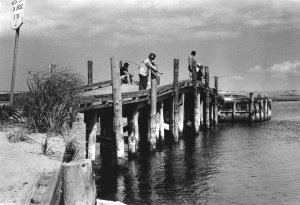Announcer: Senator Ted Kennedy may have seen his chances for becoming President deflated because of a bizarre and almost unbelievable car accident in which he was involved. That story next on 1969 In Review.
Senator Ted Kennedy’s car accident, which took the life of Mary Jo Kopechne, was a confusing tale. It all started as a party; a party for former aides to the Senator’s late brother Robert. It was shortly after 11 o’clock that night when --
Ted Kennedy: “When I left the party around 11:15 pm, I was accompanied by one of these girls, Miss Mary Jo Kopechne. Little over one mile away, the car that I was driving, on an unlit road, went off a narrow bridge, which had no guardrails and was built on the left angle to the road. The car overturned in a deep pond, and immediately filled with water. I remember thinking as the cold water rushed in around my head that I was drowning.
"Then water entered my lungs and I actually felt the sensation of drowning, but somehow I struggled to the surface alive. I made immediate and repeated efforts to save Mary Jo by diving into the strong and murky current, but succeeded only in increasing my state of utter exhaustion and alarm.
"My conduct in conversations during the next several hours, to the extent that I can remember then, make no sense to me at all. I regard as indefensible the fact that I did not report the accident to the police immediately.”
Announcer: The United Press International, 1969 In Review, will continue right after this message.
For Ted Kennedy, July, 1969 was a time for reflection; what affect did the accident have on his role as a representative of the people of Massachusetts. He decided to ask them personally on a nationally televised program.
Ted Kennedy: “If at any time, the citizens of Massachusetts should lack confidence in their Senator’s character or his ability, with or without justification, he could not in my opinion adequately perform his duties, and should not continue in office.
"The opportunity to work with you and serve Massachusetts has made my life worthwhile. So I ask you tonight, the people of Massachusetts, to think this through with me. In facing this decision, I seek your advice and opinion. In making it I seek your prayers. For this is a decision that I will have finally to make on my own.”
Announcer: The answer they gave was clear, stay in office, and he did. But the unanswered questions about the accident prompted the County District Attorney to call for an inquest which may or may not provide the answers.
Actually, the year started out rather well for the young Senator. He won the majority whip post in the Senate by defeating Senator Russell Long. His positions on the ABM, Vietnam, and the draft followed moderate liberal lines and were accepted by many. His name came up whenever someone talked about a Democratic Presidential candidate for 1972. But for him, 1969 may have changed all that.
The memory of Bobby Kennedy was regenerated when the trial of his accused assassin came to an end. The verdict, guilty. The sentence, death in the California gas chamber.
Another assassin shocked the country by pleading guilty to the murder of Martin Luther King. For his penalty, James Earl Ray received 99 years in prison. His guilty plea and conviction aroused a public who thought he may have been part of a conspiracy. However the Justice Department insisted no evidence of a conspiracy existed.











